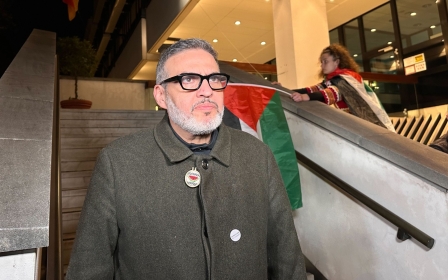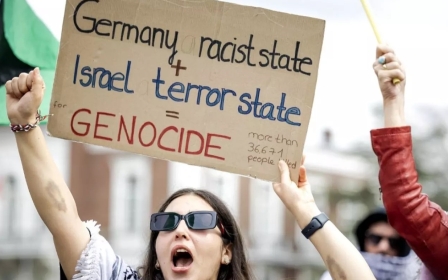Meet the Jewish activist Germany arrested for being pro-Palestinian

“Germany is promoting only those Jews who are willing to produce anti-Muslim discourse. Jews who do not perceive Muslims as such are being marked as a threat not just to the German nation but to Jews themselves.”
Udi Raz, 34, is sitting in a cafe in Berlin, where he lives, reflecting on a turbulent six months. Since Israel’s war on Gaza began following the Hamas-led attacks of 7 October, Raz, an Israeli Jew raised in Haifa, has been fired from his job and had the activist group he’s part of labelled antisemitic by Germany’s official antisemitism commissioner.
Last Friday, German authorities arrested Raz, a board member of Jewish Voice for a Just Peace in the Middle East, after they cancelled and then banned the group’s three-day conference on Palestine.
The conference, which was set to feature notable speakers including former Greek finance minister Yanis Varoufakis and leading British-Palestinian surgeon Ghassan Abu-Sittah, was cancelled by Berlin police within its first two hours on Friday.
“They came in and blocked the screening of a recorded video message, then they broke into the control room and switched off the electricity for the whole building with hundreds of people inside,” Raz told Middle East Eye.
New MEE newsletter: Jerusalem Dispatch
Sign up to get the latest insights and analysis on Israel-Palestine, alongside Turkey Unpacked and other MEE newsletters
The recorded video message was from Abu-Sittah, who had been detained after landing in Germany. The doctor told MEE that, in a basement room in Berlin’s airport, he was questioned for three and a half hours.
At the end of the interrogation, Abu-Sittah, who spent 43 days during the war treating patients in Gaza’s al-Ahli and al-Shifa hospitals, was told by German authorities that he was not allowed on German soil, that this ban would last for the whole of April and that if he tried to dial into the conference remotely – or send a video message to be played at it – that would constitute a breach in German law that could see him face up to a year in prison.
Nadija Samour, a lawyer involved with the conference, said organisers had not been “given anything in writing about why the event was being cancelled. We had been cooperating with the police through everything, nothing said or done at the venue was illegal. From the very beginning, it was clear that there would be attempts by the police to shut the conference down."
“A speaker was projected who was subject to a ban on political activity,” Berlin police said on social media after closing the conference down.
German censorship
In the last six months, German authorities have continued to crack down on the Palestine solidarity movement in Germany, including silencing several high-profile Jewish intellectuals, academics and artists.
The country’s responsibility for the Holocaust, in which six million Jews were murdered by Germany’s Nazi government, and its post-war “staatsrason”, or reason of state, a principle that places support for Israel at the core of Germany's national identity, have contributed to an atmosphere in which even Jews are now regularly branded antisemitic for criticising Israel.
'I was allowed to speak only to the extent that I had something bad to say about Palestinians, about Arabs, about Muslims'
- Udi Raz, Jewish activist
Raz, who is a leading Jewish peace activist in Berlin, has been twice detained, labelled an antisemite, lost his job, and his organisation has had its bank account frozen, as well as being branded antisemitic by Germany’s antisemitism commissioner.
The Israeli says there were clear signs that authorities in Berlin would try and shut down the event.
“The Berlin Senate had been trying for the past few weeks to stop the Palestine Congress from going forward - one of the strategies they used was to freeze our bank account. For weeks, we had been collecting donations and tickets receipts for the Palestine Congress. We still dont have access to those funds.”
Raz says that Jewish Voice for a Just Peace is constantly reminding Germans of the structural inequalities and the genocide being carried out in Palestine.
“We want everyone to be treated equally, we want human rights and international law to be respected. That makes the German state very uncomfortable; they are OK with the apartheid regime and its genocidal crimes,” he says.
Jewish Voice for a Just Peace has been campaigning for an immediate end to hostilities in Gaza and demanding that the German government suspend diplomatic, economic support and weapons sales to Israel.
Fired and branded antisemitic
Raz told MEE that he feels there exists a clear disparity in the treatment of pro-Zionist and anti-Zionist Jews in Germany.
“Whenever I had the opportunity to speak from my own perspective, I was allowed to speak only to the extent that I had something bad to say about Palestinians, about Arabs, about Muslims. Whenever that was not the case, and I brought up the Palestinian narrative, insititutions were pointing at me and accusing me of antisemitism.”
Previously a tour guide at the Jewish Museum in Berlin, Raz was fired for referring to Israel’s occupation of the West Bank as “apartheid” on tours.
Since 7 October, several Jewish groups, academics, artists and human rights activists – including Israelis like Berlinale-winning journalist Yuval Abraham, who was branded an antisemite in Germany - have called out Germany for suppressing any criticism of Israel's war in Gaza and the Palestine solidarity movement in the country.
Last week, a leading Jewish American philosopher, Nancy Fraser, was disinvited from taking up a professorship at the University of Cologne after signing a letter expressing solidarity with Palestinians and condemning the killings in Gaza carried out by Israeli forces.
In December, Russian-American journalist Masha Gessen was at the centre of a similar controversy after official German sponsors removed their support for the Hannah Arendt Prize – which was being awarded to Gessen – because of a New Yorker article in which which the Jewish writer drew a comparison between conditions in Gaza today and the Warsaw Ghetto.
A history of migration
Raz told MEE that while growing up in Haifa, he was aware of two distinct realities that existed in that region between the Jewish and Palestinian population.
“I did not feel comfortable there. For me, the act of emigrating from Israel and landing in Germany was an act of finding my own home, where everyone was equal and human rights were respected.”
'If you are a conscientious Jew, not willing to support a genocide in your name and wanting to speak out against it, you will be persecuted in Germany'
- Udi Raz, Jewish activist
Soon after moving to Berlin in 2010, Raz says, he felt that he was being celebrated by cultural institutions and politicians because of his Jewish heritage.
“However, I did soon realise that, while in Germany my Jewishness was being celebrated, I felt like a second-class citizen, so I found more in common with other minority religious groups.”
He adds that while he did feel excluded, he was constantly reminded that being an Israeli Jew he had easier access to higher social standing in German society because he embodied a “superior” white western European heritage.
“Today, Jews in Germany are being divided along political lines: if you are a conscientious Jew, not willing to support a genocide in your name and wanting to speak out against it, you will be persecuted in this country, and if you are happy with the hate and the genocide being carried out then you can live in peace and enjoy your privilege,” he says.
When asked about the future, Raz draws on his family’s history and suggests quietly that his days in Germany might be numbered, while firing off a warning to Jews wanting to settle here.
“My grandparents lived in Lithuania before the Second World War. I often ask myself that, as the Nazis marched into Lithuania, at what point did my grandparents decide that it’s time to leave, and then eventually at what point in time did they realised that it's perhaps too late to leave?”
His head hanging down, Raz says, with a defeated look, that space for Jews in Germany to express their political opinions safely and openly is shrinking.
“All this is happening under a Social Democrat government; you can only imagine what will happen when the far-right AfD comes to power.
“My request to all my Jewish brothers and sisters is that, if you are considering moving to Germany, think twice.”
Middle East Eye delivers independent and unrivalled coverage and analysis of the Middle East, North Africa and beyond. To learn more about republishing this content and the associated fees, please fill out this form. More about MEE can be found here.





